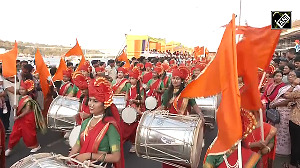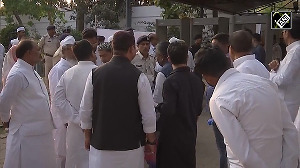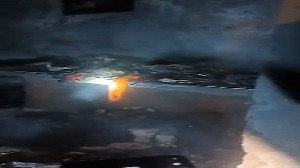There is, between Rao's tenure as PM and the current Modi regime, a powerful resonance of how transition can be managed.
Rao's tenure saw many scams -- one where he was supposedly approached by Harshad Mehta with a bribe for making the securities scam go away.
The Opposition insisted on a JPC.
Despite knowing a JPC report would undermine him politically, Rao agreed to one, saying he had 'nothing to hide'.

It could have happened to anyone, but the incident makes the book.
In 1995, Prime Minister P V Narasimha Rao was to make a statement about the autonomy of Jammu and Kashmir ahead of elections in the state.
There was no enthusiasm in his Cabinet for the proposal, but Rao was determined to go ahead, after holding extended talks with Farooq Abdullah.
The question was the logistics of the announcement: He was to go to New York for the UN general assembly via Burkina Faso where the flight stopped for refuelling.
Rao's broadcast had to be recorded between November 2 and 3, 1995, and transmitted to Delhi through an international satellite that passed over Burkina Faso once in 24 hours, but for less than an hour.
A special Doordarshan cameraman had been detailed to travel with the PM's team and transmit the recorded broadcast.
After chopping and changing many drafts, the PM recorded his historic broadcast.
Rao chose his words carefully, sticking to recorded history and announced that the 'sky was the limit' for discussing Jammu and Kashmir's autonomy within the Indian Constitution.
Afterwards, the PM waited for the cameraman to say okay before a farewell call to the head of Burkina Faso on his way to the airport.
Then came the bombshell: The cameraman had forgotten to load a tape in the video camera!
S Narendra, as spokesman for the government and the prime minister, was incandescent.
But he had presciently asked the cameraman of private news agency ANI to record the speech.
The backup recording was procured and duly transmitted.
Many books have been written on P V Narasimha Rao, one of India's most consequential prime ministers -- including his own, the thinly disguised The Insider.
But this one -- India's Tipping Point: The View from 7 Race Course Road (Bloomsbury India) is important because Mr Narendra not only enjoyed a close relationship with the prime minister but was also privy to the political pulls, pressures and decisions taken to manage contradictions.
At many points in the book you can sense that Mr Narendra knows a lot more but is holding back.
For instance, lore has it that when the 1994 securities scam broke, Rao's finance minister Manmohan Singh offered to resign, but Rao turned this down as faxes from world leaders poured into the PMO urging him not to jettison one of the government's tallest leaders.
Mr Narendra does not confirm this. What he does confirm is the persistent undermining of Rao's authority by then human resources and development minister Arjun Singh, who eventually left the Congress to form his own group, hoping Sonia Gandhi would oblige by blessing the move.
She never did, and for all his reputation as a master strategist, it turned out to be a dud move.
Between Rao and Sonia Gandhi, there was great tension.

Mr Narendra describes the turning point as a meeting at Raj Ghat where the PM arrived a few minutes after Ms Gandhi and greeted those present including her.
She responded by turning away.
That happened in 1992, well before those close to the Gandhi clan claimed the various enquiries into Rajiv Gandhi's assassination were simply not pursued with the vigour expected from a Congress government.
The greatest challenge, however, was to handle how economic reforms, some extremely painful, were presented to the public.
Privately Congress politicians had made it clear they were underwhelmed by the government's new economic policy.
The 1992 Tirupati party session was the crucial test.
As Congress president, Rao himself drafted the economic resolution, seeking to emphasise the continuity-with-change element, the famous 'bypass' model.
It was reform with a human face, and the idea of pitching the poor as daridranarayan came from Mr Narendra.
He writes that there were times Dr Singh and commerce minister P Chidambaram's use of words such as divestment, exit policy and labour reforms were politically unsettling.
Rao tried to balance the unease of the political leadership.
Indeed, the whole Rao tenure, Mr Narendra believes, was about balancing.

There is, between Rao's tenure as PM and the current Modi regime, a powerful resonance of how transition can be managed.
Rao's tenure saw many scams -- one where he was supposedly approached by Harshad Mehta with a bribe for making the securities scam go away.
The Opposition insisted on a joint parliamentary committee.
Despite knowing a JPC report would undermine him politically, Rao agreed to one, saying he had 'nothing to hide'.

Mr Narendra describes the demolition of the Babri Masjid and Rao's personal anguish, describing all the efforts he took to ensure consultation to prevent that from happening.
For the first time we hear the importance of the role of then Rajasthan chief minister from the Bharatiya Janata Party, Bhairon Singh Shekhawat.
Rao believed he had been made a scapegoat.
He could not have dismissed the Kalyan Singh government in UP because in court the chief minister had given undertaking that no harm would come to the structure.
This argument that the demolition could have been avoided had Rao sacked the government and imposed President's rule, was offered by Arjun Singh and then home minister S B Chavan who, in his memoirs, blamed Rao for the demolition.
Mr Narendra writes that at no point during Cabinet meetings did Chavan ever say the UP government should be sacked.
This book offers many insights into a period of India's economic and political transformation.
Its understated style, barring a few proofing mistakes (the founder of Amul was V Kurien, not P J Kurien, for instance) makes it an invaluable reference book for everyone who wants to understand the 1990s.











 © 2025
© 2025